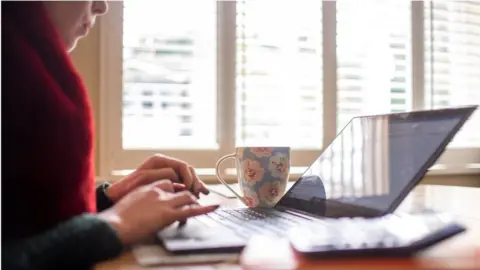Coronavirus: Young people 'more anxious during lockdown'
 CO90s
CO90s The number of young people experiencing anxiety has increased during the Covid-19 pandemic, a study has found.
Bristol-based Children of the 90s asked 7,000 people across two generations about their mental health and lifestyle before and during lockdown.
The study found the number of 27-29 year olds experiencing anxiety rose from 13% to 24% and they were more anxious then their parents.
Underlying conditions and financial worries may be behind the increase.
'My social circle disappeared'

Jacob, 28, from Hambrook, recently lost his job and found a lack of interaction very difficult as his social circle dropped "totally to nothing".
He is also worried about the easing of lockdown.
"I'm struggling to see how people are taking it seriously and I'm worried about how a second wave will impact us," he said.
"It makes me anxious, it makes me worried about what the long-term effects are going to be."
Lockdown 'hard for a first-time mum'

Another participant, Heidi, a first time mother, said lockdown left her feeling "very isolated, anxious and depressed".
"I'd had this group of mum friends, so if I was over-thinking something about my daughter or how I was doing things, I could ask for help," she said.
"Once that was all taken away from me - my anxiety skyrocketed."
What did the study find?
 PA Media
PA MediaThe results from the study suggested young people saw anxiety levels rise while the older generation reported a much lower frequency of anxiety similar to pre-pandemic levels.
It said there was no evidence that depression levels were any higher overall.
The findings endorsed recently introduced "support bubbles" for single adults and said they should be encouraged if mental trauma suffered by young people was to be reduced.
Women with pre-existing health problems were also at higher risk of anxiety and depression.
But the study did not find key workers, including those in the healthcare sector, faced a greater risk.
'Fears about the future'
Study researcher Alex Kwong, from the University of Bristol, believes financial problems and underlying mental and physical health conditions may be behind the increase in anxiety.
"During the pandemic we can calculate how much someone has changed... and what we've found is that change is the same sort of clinical relevance that you'd see in the opposite direction if they were receiving treatment."
The findings also provide evidence for specific groups at greater mental health risk, such as those living alone, researcher Rebecca Pearson added.
Stephen Buckley, from the mental health charity Mind, said people were "really struggling with isolation, stress, grief, financial worries and fears about the future".
"The current situation has required us all to make relatively big and sudden changes to our lifestyle, requiring adjustment," he said.
"This will also be the case after lockdown measures have been lifted, and will continue to have a significant impact on those of us experiencing poor mental health like anxiety."
Between April 1991 and December 1992 more than 14,000 pregnant women from the Bristol area were recruited into the Children of the 90s programme and their children and partners' lives have since been tracked by researchers.
Funded by the Elizabeth Blackwell Institute, the findings are now one of the most detailed resource of their kind in the world.

- THE R NUMBER: What it means and why it matters
- AIR TRAVELLERS: The new quarantine rules
- LOOK-UP TOOL: How many cases in your area?
- RECOVERY: How long does it take to get better?

